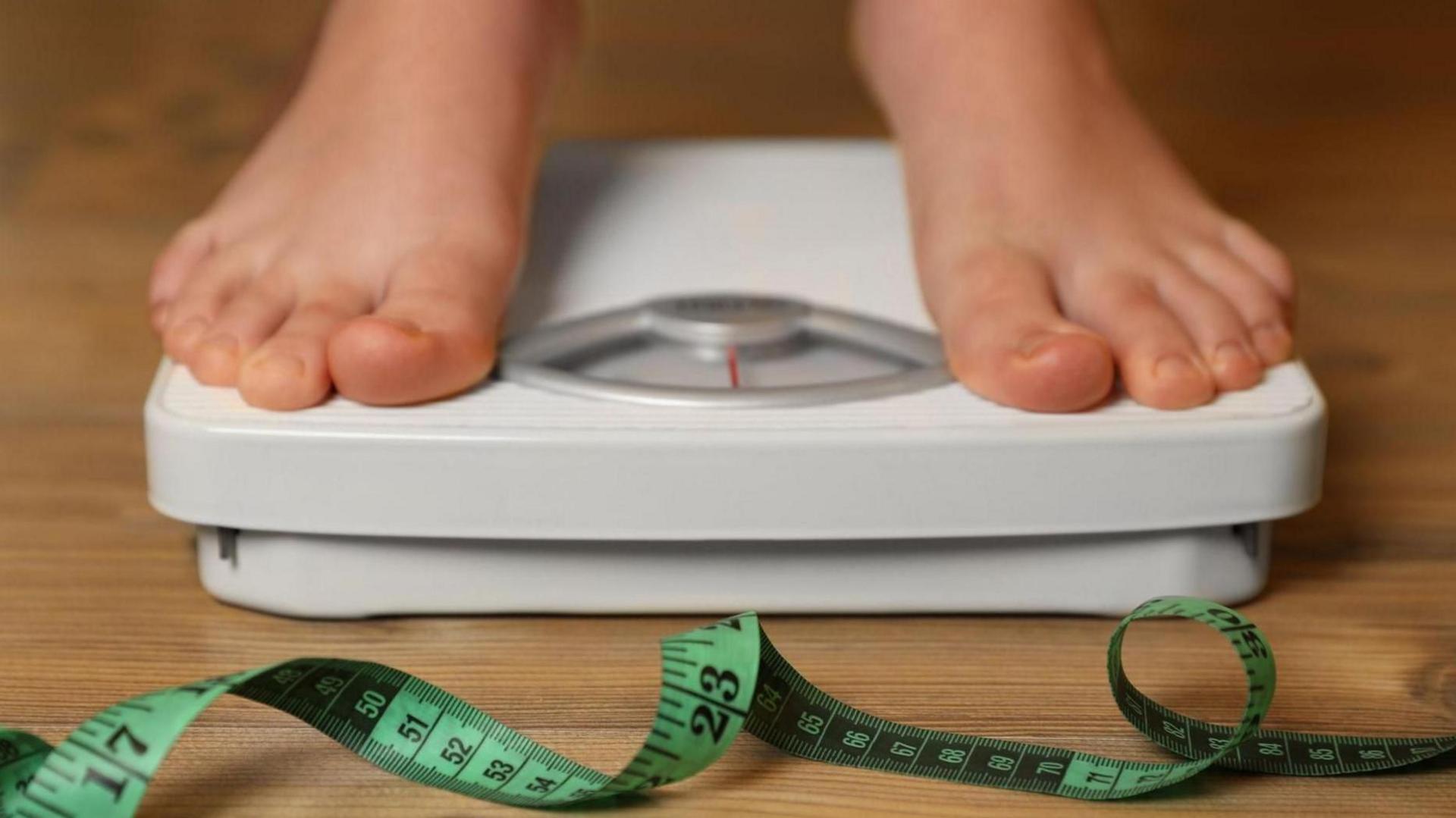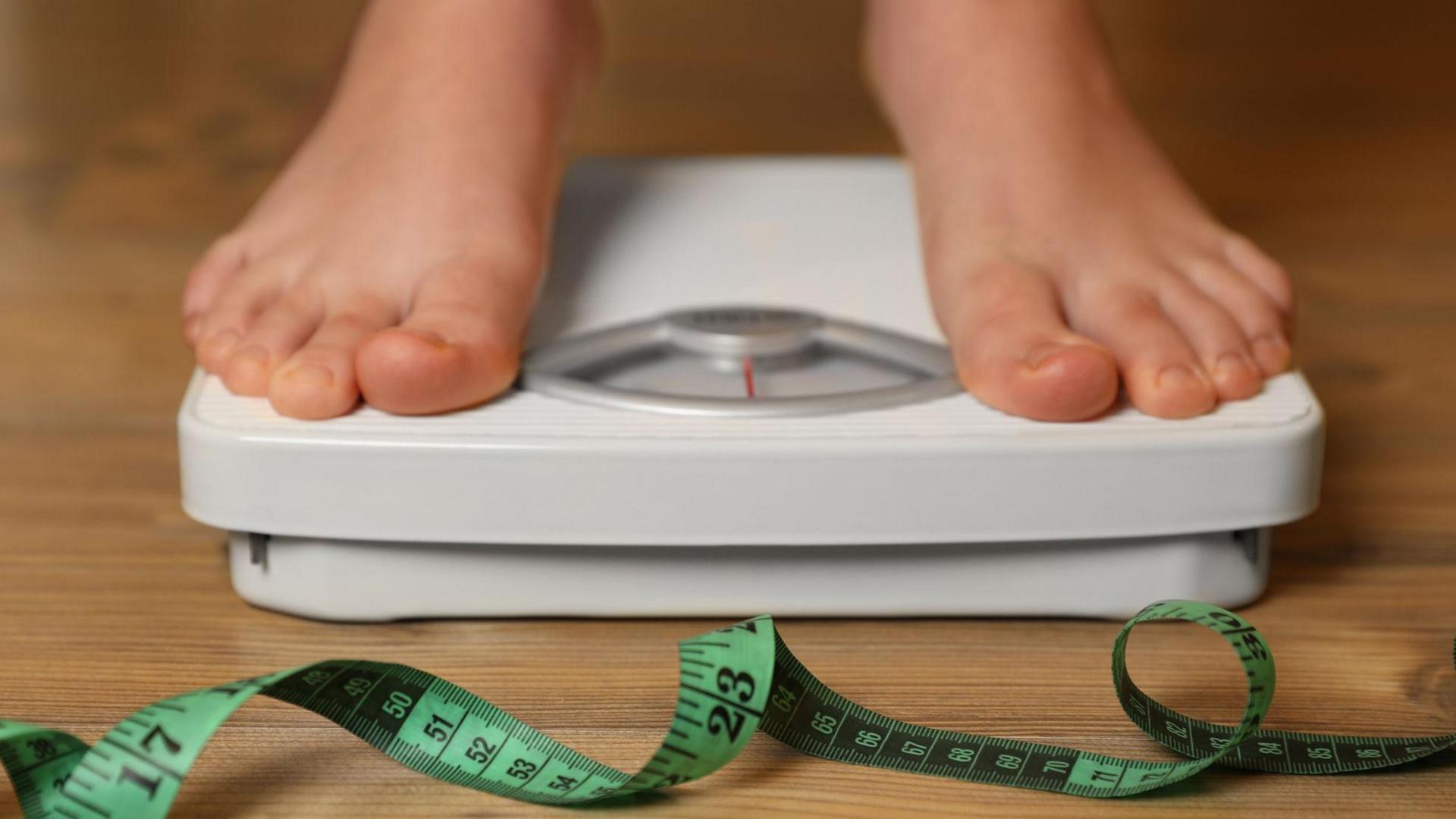Will Serena Williams's weight-loss admission help shed stigma of anti-obesity drugs?

- Published
Serena Williams, one of the most successful athletes of all time, has spoken out about using weight loss drugs - she says, to lift the "stigma" around using such medication.
Will her outspoken comments instil a new sense of confidence in those using the drugs? And could her honesty quieten the critics?
The 43-year-old tennis star, who broke records and won 23 grand slam titles through her career, was the embodiment of fitness and athletic prowess. But, after having kids, even she, like so many of us, has admitted to struggling to shift those extra pounds.
In the end, Williams told the Today Show on TV in the US, that she had to look at her extra weight as "an opponent". Despite "training five hours a day" and "running, walking, biking, stair climbing," she couldn't pulverise this adversary like she did to her opponents on the tennis court - so in the end, she says, she had no other choice but to "try something different".
Many of her friends were using GLP-1 - the group of medications which help with weight loss, so she decided to try it.
Williams is adamant that the medication route - she won't say which brand she is taking - wasn't easy, and certainly not a shortcut to her losing 31lb (14kg) over the past eight months.
There is scepticism about the timing of the tennis star's recent transparency - she has just become a spokesperson for Ro, a company which sells GLP-1 brands like Wegovy and Zepbound (known as Mounjaro in the UK) through its weight-loss programme, and her husband is also an investor.
Despite this and the potential side effects of taking the medication, her honesty will hit a nerve for many - she says she is speaking out to take away the shame that so many women feel when it comes to using drugs to help them lose weight.
How do weight-loss drugs like Mounjaro and Wegovy work?
- Published29 August
How will weight-loss drugs change our relationship with food?
- Published19 October 2024
Caleb Luna, assistant professor of feminist studies at the University of California, says having someone like Serena Williams speaking out is "a breakthrough".
They say it helps silence the critics of how "weight loss is achieved" who say that "people are taking the easy way out" by using weight loss drugs.
"It gets rid of the stereotype that these drugs are for fat people who are being lazy and incompetent.
"In that respect it's maybe a good thing."
But Caleb also says the revelation about her need to resort to using GLP-1 medication is slightly "terrifying" and makes them feel "a little bit sad". They worry that all it does is belittle hard work and dedication, instead, focussing on appearance and the pressure to look a certain way.
"She has achieved things that so few people, in our time and throughout history have achieved.
"But now it just shows how all those accomplishments can be undermined by body size.
"Scarily, weight loss seems to outshine all those record-breaking achievements."
'Healthy weight'

Williams, who won 23 grand slam titles, retired from professional tennis in 2022
Williams's weight and her looks have been scrutinised throughout her life. The burden, the pressure to fit in with society's expectations does not diminish no matter how much sporting success an athlete has in their career.
And while she may be the most high profile sports star who openly uses weight loss medication, there are many others in the public eye who have spoken out.
Oprah Winfrey says she uses GLP-1 as a tool, along with exercise and healthy eating, to stop herself "yo-yoing" with her weight.
Actress Whoopi Goldberg says she lost the weight of "two people", external after taking the drug, and singer Kelly Clarkson, who says she was "chased" by her "doctor for two years" before she agreed to take it, are among the dozens of stars who have been open about taking the medication.
Williams left the world of tennis behind back in 2022, when she played the final match of her career in the US Open, but she is still a powerhouse of strength and has wanted to reach what she describes as her "healthy weight" since the birth of her second child, Adira.
In her interview with the Today Show, says she felt like her "body was missing something" and she wasn't able to get down to what she felt comfortable with - despite intense training.
Dr Claire Madigan, a senior research associate in behavioural medicine at the School of Sport, Exercise and Health Sciences at Loughborough University, says elite athletes can find it hard to lose weight.
"They are used to consuming a lot of calories and when they leave the sport they can find it difficult - it needs a change in behaviour."
Dr Madigan said it was good to see that Williams mentioned her weight loss was not just down to the drug - "she did have to focus on the diet and physical activity".
She added: "It's great she is talking about how difficult it is to lose weight after having a baby."
But she wonders if Williams's message might be lost and even demotivate some women. "The drugs are quite expensive and the average person may think here is an elite athlete, she's got access to the gym, she's got time, she has a nutritionist… and she's had to use GLP-1s".
Dr Madigan also expressed concern that the potential side effects of taking the drugs - which can include gastrointestinal problems like vomiting and diarrhoea, and in rare cases, gallbladder and kidney problems - may not have been widely discussed in the publicity surrounding Williams's announcement.
Williams says she did not experience any side effects, and told Women's Health magazine that she is finally seeing the benefits of all her hard work at the gym.
"My joints are a lot better," she says, "I just had my check-up, and the doctor said everything - including my blood sugar levels - looked great."
And, even though, she's no longer breaking new ground on the tennis courts, she is still smashing her own records, with the help, she says of weight loss drugs. She's currently training for a half marathon.
"I am running farther than I ever have," she says proudly.
Additional reporting by Alex Kleiderman
Related topics
- Published14 August

- Published12 May
